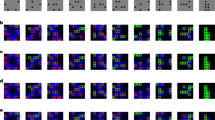Abstract
A basic principle of human memory is that lists that can be organized into memorable 'chunks' are easier to remember. Memory span is limited to a roughly constant number of chunks and is to a large extent independent of the amount of information contained in each chunk1,2. Depending on the ingenuity of the code used to integrate discrete items into chunks, one can substantially increase the number of items that can be recalled correctly. Newly developed paradigms3 for studying memory in non-verbal organisms allow comparison of the abilities of human and non-human subjects to memorise lists. Here I present two types of evidence that pigeons 'chunk' 5-element lists whose components (colours and achromatic geometric forms) are clustered into distinct groups. Those lists were learned twice as rapidly as a homogeneous list of colours or heterogeneous lists in which the elements are not clustered. The pigeons were also tested for knowledge of the order of two elements drawn from the 5-eIement lists. They responded in the correct order only to those subsets that contained a chunk boundary. Thus chunking can be studied profitably in animal subjects; the cognitive processes that allow an organism to form chunks do not presuppose linguistic competence.
This is a preview of subscription content, access via your institution
Access options
Subscribe to this journal
Receive 51 print issues and online access
$199.00 per year
only $3.90 per issue
Buy this article
- Purchase on Springer Link
- Instant access to full article PDF
Prices may be subject to local taxes which are calculated during checkout
Similar content being viewed by others
References
Miller, G. A. Psychol. Rev. 63, 81–97 (1956).
Simon, H. Science 183, 482–488 (1974).
Terrace, H. S. in Quantitative Analyses of Behavior (eds Herrnstein, R. J. & Wagner, A.) 115–135 (Ballinger, Cambridge, Massachusetts, 1982).
Terrace, H. S., Straub, R. O., Seidenberg, M. S. & Bever, T. G. Bull. Psychonomic Soc. 10, 269 (1977).
Straub, R. O. & Terrace, H. S. Ann. Learning Behav. 9, 454–468 (1981).
Terrace, H. S. J. exp. Psychol. Ann. behav. Proc. 41, 203–214 (1986).
Terrace, H. S. J. exp. Psychol. Ann. behav. Proc. 12, 215–234 (1986).
Clauson, H. D., Izatt, E. J. & Shimp, C. P. J. exp. Analysis Behav. 43, 257–264 (1985).
Terrace, H. S. in The Biology of Learning (eds Marler, P. & Terrace, H. S.) 15–45 (Springer, New York, 1984).
Bryant, P. E. & Trabasso, T. Nature 267, 331–350 (1971).
McGonigle, B. O. & Chalmers, M. Nature 267, 355–377 (1977).
Chalmers, M. & McGonigle, B. O. J. exp. Child Psychol. 37, 355–377 (1984).
Fountain, S. B., Henne, D. R. & Hulse, S. H. J. exp. Psychol. Ann. behav. Proc. 10, 30–35 (1984).
Capaldi, E. J., Verry, D. R., Nawrocki, T. M. & Miller, D. J. Ann. Learning Behav. 12, 7–10 (1984).
Tulving, E. Psychol. Rev. 69, 344–354 (1962).
Author information
Authors and Affiliations
Rights and permissions
About this article
Cite this article
Terrace, H. Chunking by a pigeon in a serial learning task. Nature 325, 149–151 (1987). https://doi.org/10.1038/325149a0
Received:
Accepted:
Issue Date:
DOI: https://doi.org/10.1038/325149a0
This article is cited by
-
Chunking as a rational solution to the speed–accuracy trade-off in a serial reaction time task
Scientific Reports (2023)
-
Learning and organization of within-session sequences by pigeons (Columba livia)
Animal Cognition (2023)
-
Age affects pigeons’ (Columba livia) memory capacity but not representation of serial order during a locomotor sequential-learning task
Scientific Reports (2021)
Comments
By submitting a comment you agree to abide by our Terms and Community Guidelines. If you find something abusive or that does not comply with our terms or guidelines please flag it as inappropriate.



